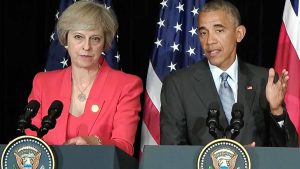The hard reality that Prime Minister Theresa May should be grappling with after attending the G20 Summit in China is that the path out of the European Union for Britain is getting lonelier by the day. She was left in no doubt by the Japanese government about the potentially disastrous consequences should Britain cease to be a major participant in the EU Single Market. Meanwhile, President Obama left no doubt that negotiating a new, post-Brexit trade deal with the UK would be a distinctly lower priority for Washington than forging closer links with the EU.
When British Government chooses to talk tough on the Brexit issues, it just makes the Brexit Lane not only narrower but also lonelier. Hear the Brexit Minister yesterday on television “If a requirement of membership of the EU Single Market is giving up control of our borders, that makes it very improbable”
John Palmer in a Social Europe commentary toyed with the idea of a second referendum but quickly paused to ask the intelligent question: what about? I liked all that he had to say in attempting to find an answer to that question but also in presenting alternative strategy*
Since the “Brexit” referendum in June, there has been a series of demonstrations demanding a second referendum on Britain’s EU membership. The call for a replay of the vote echoes the widespread shock at the outcome on June 24. The clamour for a second vote in this form has been impressive in scale but, although understandable, it reflects a mistaken strategy.
The mere attempt to raise the issue has resulted in an orchestrated chorus of “foul play!” from the Leave camp hardliners. If a replay vote were to be held, the million and one arguments for Britain remaining a member of the EU would be drowned out by charges of “democratic sabotage” from populist, nationalist and anti-immigrant Tory and UKIP factions.
There is, however, a more compelling case for a referendum on a quite different issue: the withdrawal terms that the Conservative government will eventually seek and/or secure from its EU partners. These would include not only the precise relationship that the UK would retain with the EU and its Single Market but also the legal basis on which the government would negotiate new, global trade deals.
Both questions obviously raise hugely important issues for the UK and for the different nations which make it up. To take just one example: would there have to be a hard border between Northern Ireland and the Irish Republic or, as some suspect, border controls within the UK between Northern Ireland and the British mainland (as temporarily existed during the Second World War?) The remarkable thing is how little attention this has received in the media.
These issues never formed part of the background to the referendum decision which the British people were asked to make earlier this year. But they cannot be allowed to come to pass without democratic validation either by Parliament or through a referendum. The impact on the British economy – and society as a whole – could be radically different depending on which one of the very different alternative relationships with the EU eventually emerges. If the government loses a validation vote in the House of Commons or in a new referendum, it would have no real choice but to retract its eventual Article 50 decision – as it would have every legal right to do.
An indication of just what is at stake has already come at the G20 summit in China. The prime minister, Teresa May, was left in no doubt by the Japanese government about the potentially disastrous consequences should Britain cease to be a major participant in the EU Single Market. Meanwhile, President Obama left no doubt that negotiating a new, post-Brexit trade deal with the UK would be a distinctly lower priority for Washington than forging closer links with then EU. Meanwhile, Mrs May risks a frosty reaction from Leave hardliners by declaring that their favoured “Australian” points system for restricting EU migration to Britain simply will not work. Both factions in the government are struggling to articulate a detailed Article 50 negotiating mandate handicapped by the dearth of trade expertise in Whitehall. The UK lost most of its foreign trade competence to the EU 40 years ago, but the Brexiteers had no idea of how acute the shortage of expertise really was until they took office.
Add to this the fact that the Conservative government has a very small majority in the House of Commons (12 MPs), that its EU partners are not going to be a soft touch if it tries to secure a super-privileged deal with the Union and it is not hard to see the political perils facing Mrs May in the months ahead. Even so, she has confidently ruled out both a second referendum and even a mandatory vote of approval in Parliament for the eventual Article 50 outcome.
The only factors that might work in her favour are the internal dissension in the Labour Party following the attempted removal of Jeremy Corbyn from the leadership and the Nigel Farage succession rows in UKIP. But both are likely to be resolved very soon. All the indications point to a triumphant re-election of Corbyn as leader later this month. Leading members of the Labour “Shadow Cabinet” have made it clear that the Labour opposition will fight hard to secure guarantees against any dilution of existing EU social and Labour right and environmental standards. They also insist that a Brexit UK vetoes any “race to the bottom” in such areas by ensuring that UK matches EU standards.
The co-leader of the Green Party, Caroline Lucas, has rightly already demanded a second referendum on the final Article 50 package.
Corbyn and Lucas share very many common political positions and this should logically be another. After all this would not be a re-run of the summer referendum but one concerned with the futureconstitutional, social and economic rights of the British people.
The Tory government may try to block both a second referendum and a mandatory vote of the House of Commons. But between now and the date when the two-year Article 50 process is exhausted, the pressure of domestic and overseas political events as well as a worsening economic situation (and those impressive pro-European demonstrations) may force the government to rethink. One can only hope so.
*Based on an analysis in the 7 September 2016 in Social Europe originally entitled “A Second Referendum – But What About” by John Palmer


